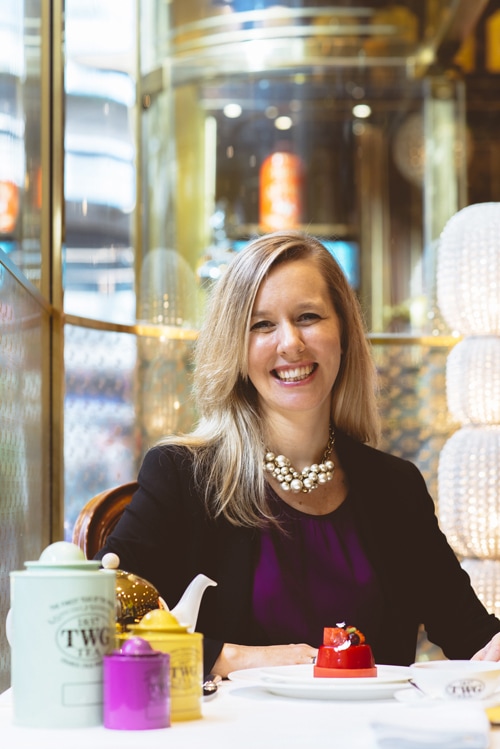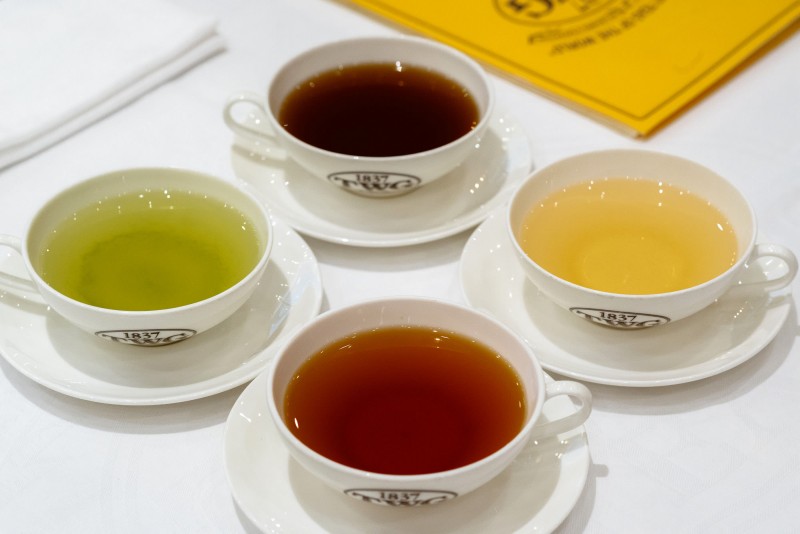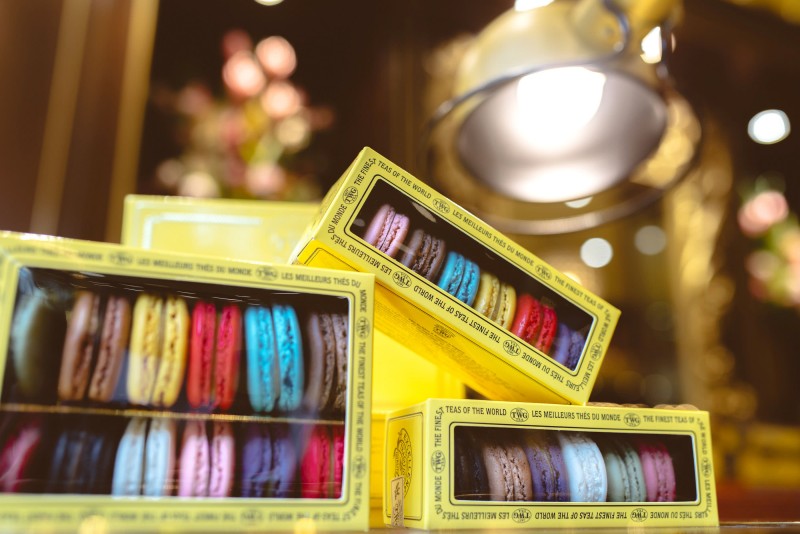A glance at the extensive menu reminds me of my neophyte status. Opposite me sits Maranda Barnes, awaiting my selection. She’s patient. Brief seconds later, she throws me a lifeline, and suggests Weekend in Bombay, a Darjeeling Black Tea. I take the bait. “It’s blended with a little bit of bergamot, sugar—almost like a Darjeeling Rum Tea, without the alcohol,” she tutors me.
It is my first time at the gourmet beverage brand, which opened its doors in Singapore in 2008. Since then, the interiors of TWG’s salons and retail outlets have become somewhat of a local icon. Even if you have not caught the name, saying ‘the one that’s all golden lah’ can be a very helpful descriptor from a recommending friend to jog your memory. Its stores are strategically located, such as near luxury retail outlets at Orchard Ion, joints and intersections where potential Tea-guzzlers may be lurking while breaking between Valentino and Versace, and supplicants like myself, who stumble in for a virgin experience. Mine, however, hosted no less by the co-founder herself.
As I explain my unique Tea-preparation experience, that is, inserting a green-teabag into a 500ml 7-eleven mineral water bottle, I expect to be summarily canned as a ‘Tea-murderer’ or ‘sacrilegious’. My execution is delayed as the waiter serves our orders: Weekend in Bombay, Silvermoon, White Gold, Singapore Surprise, and an assortment of patisserie. But I wasn’t being judged. “We’re not a snobby colonial Tea salon.” The Tea Storyteller of TWG Tea assures me.
This is corroborated by the families with young children around us, tourists, and a token pair of chi-chi-looking aunties at our adjacent table. On the other side, a television crew is filming for a channel 8 TV programme. I feel a certain delightful, sanitised vibe here, almost like I’m part of the filming. The waiting crew looks as though they’re required to maintain a modest BMI, gym routine, or drink the Milk Oolong, which Victoria Beckham supposedly administered to regain her post-natal figure. Impeccably dressed, their hair is greased, and pulled back. Even more important than looking the part however, is Tea knowledge.
Conversations with Maranda Barnes
YONG HUI YOW: Is being obsessed with Tea a pre-requisite to work here?
MARANDA BARNES: Yes, you have to be a connoisseur to work at TWG Tea. Every of our 3,000 staff members are required to have extensive knowledge about the beverage they’re selling; in this case, an assortment of more than 800 different blends.
YONG HUI: How does one learn to love Tea?
MARANDA: Nobody is a connoisseur from Day 1. You have to go through training, Tea-tastings, and be absorbed in an ongoing learning experience. You have to take an exam too. (For the service staff) It’s easy to become overwhelmed at first, but once you’re given a few keys, it gets exciting. One of the keys to our success is a great training team. We have 6 full-time staff members who are Tea connoisseurs dedicated to training. Training is a work-in-progress. Different people have different growth and learning rates.
YONG HUI: What about your non-frontline staff?
MARANDA: We want to make sure there is a certain level of understanding of all of the Teas across the board – our finance team, packing team, chefs, sales teams, and our PR agency – everybody goes through Tea training. When you’re speaking with customers, you’d better know your product. What kinds of qualities do you go for in your Tea?
YONG HUI: As long as it keeps me awake, really.
MARANDA: It doesn’t have to be Green Teas then! Green Teas in general, have very high quantities of vitamins and minerals, so a lot of the boost of energy from green Tea is from that, rather than from caffeine. In a Black Tea however, like the Darjeeling, you get a very mild taste, but incredible amounts of tannin.
YONG HUI: I heard about the Silvermoon blend. Tell us more about it.
MARANDA: The Silvermoon was the very first blend we had to appeal to Singapore, and the region, because it was created to pair with the moon cake. It’s one of our top 3 bestsellers worldwide. It’s perfect for any time of the day, with any pastry or any food. It’s blended with different types of Chinese and Japanese Green Teas, with wild strawberries, seeds, and a little bit of sugars, and milanaise. It’s lovely.
YONG HUI: How do you come up with the blends?
MARANDA: We have a team of blenders, but each blend is first created by Taha [Bouqdib]. That’s his expertise. He also chooses the fine harvest Teas, and the estates we work with. Taha creates the taste of TWG Tea; I come up with the stories around the Teas.
YONG HUI: He’s the Tom Ford.
MARANDA: Yes, exactly! We all have different roles, and each of us, in our own way, make it happen.
YONG HUI: Who designed the interiors of the salons?
MARANDA: It was Taha, 100 per cent. As his wife, this is one quality I did not know he had. When we opened our first outlets at Republic Plaza and Ion Orchard, he hardly slept for 3 or 4 months, because construction was done at night, and we would work during the day. I got really concerned about him, so I asked him if he needed an interior designer to help. But no, he knew exactly what he wanted the outlets to look like, how he wanted to differentiate TWG Tea from all other shops.
YONG HUI: Why did you choose Singapore?
MARANDA: We fell in love with Singapore the day we visited. It’s the cornerstone of this part of the world. Amazing quality of life, equality for different types of people and backgrounds – it’s quite an utopia. When you start travelling, you realise how rare Singapore is. It’s also very encouraging of new entrepreneurs.
YONG HUI: How hard was it to build the brand?
MARANDA: It was mind, body, and soul, but we knew what we were getting into. We knew starting a business with the largest Tea list in the world, with a retail business, an F&B business, as well as a wholesale business, was something more than most companies would dare to do starting out. It takes a very young, dynamic passionate group of people to pull something like that off. It was incredibly exciting, and it still is. We are very proud to be a Singapore brand. We want to make Singapore the hub of Tea-drinking.
YONG HUI: Did it start from retail first, or wholesale?
MARANDA: It was wholesale first. When we arrived, before we even had a name for the company, we had already approached hotels in Singapore. One in particular, the Fullerton Hotel, was fascinated by the quality of our Tea leaves, and the blends we had created. It was this response that we knew the business would take off. About 8 or 9 months later, we opened our first outlet, comprising a retail and Tea salon. Many people however, said it was a coffee culture here; young people don’t want to drink Tea.
The spirit of the brand is: we want to be the least snobby about the way people come. This is not only the conception of TWG Tea; it’s also the conception of Tea.
YONG HUI: How is that playing out? Is the young an important demographic for TWG Tea?
MARANDA: Yes, we want young people to come in from their coffee shops. We want to show them that Tea is not a fuddy-duddy, old-people beverage. Tea can be modern, fruity, and blended with chocolate, caramel, something rare, and can also be extravagantly expensive, like art! At the same time, we want a 14-year old to be able to come in and pick up his or her favourite Silvermoon Tea, and put it in a tin can on her shelf.
YONG HUI: When I run out of gift ideas, I find myself running out to get TWG Tea. How big is gifting for TWG?
MARANDA: It’s huge. Tea is something that can be enjoyed by peoples of all ages, no matter what religion, dietary restrictions, and some that even children can drink. At least 30,000 cups of tea are being consumed every second around the world. It’s also a very healthy drink. If you don’t know what to give your boss, because you don’t know if they drink wine or not, or have any health problems, and it’s not appropriate to ask, Tea would be great.
YONG HUI: It’s better than gifting chocolate.
MARANDA: It’s true! I have a friend who just had a baby, and I wanted to send a box of chocolates, then I realised that’s not the appropriate thing. For us, the packaging, Teabags, ribbons, and tins, all have an element of luxury, so that when you gift it, you go, ‘Oh, this is really lovely!’. Part of the pleasure is in un-wrapping a gift, how it feels to receive.
YONG HUI: I have received a few TWG Teas, but somehow, it just sits around.
MARANDA: That’s the fun part about Singapore. People recognise quality products, but not necessary for how to prepare it, or how best to serve it. That’s where we come in. People are busy; they don’t want to fiddle over a Teapot for 25 minutes, so we have little Teabags that you can use to put the Tea in.
YONG HUI: Do you have alcohol-infused Teas?
MARANDA: We have Tea-infused cocktails. Also, any Tea you have at TWG, can be had iced or hot. Some are better than others iced, depending on the strength. You wouldn’t want to take a very rare, white Tea iced, as it will dilute some of the flavour. But Teas like this (Darjeeling Black Tea) are absolutely perfect either way.
YONG HUI: What surprises you about people’s Tea choices?
MARANDA: I’m surprised when people tell me their favourite Tea is Green Tea because for me, that’s one of those Teas you appreciate after you’ve gone through all the other common Teas. Green Tea is a connoisseur’s Tea, especially in its preparation. It can also veer towards the very toasted tannin-bitterness. For example, Japanese green Tea, instead of having that fresh grassy colour and flavour, it can be quit soppy, and have those dry notes that cover your tongue.
YONG HUI: Do you plan to start a Tea school?
MARANDA: Yes, we have a Tea Institute, and eventually hope to open it up to the public. We already do some of that now, but a full-fledged institute will be a lot more hardcore.
At TWG Tea, it’s Tea first. But I drink my occasional coffee, in fact, they always joke about it – ‘Maranda must be tired today; she’s drinking her coffee!’
YONG HUI: What happens if you spot an employee at Starbucks?
MARANDA: [laughs] Well, they have their free time! However, I can be draconian in the office, in the sense that, if someone brings a coffee into the office, it’s like bringing a coffee in here to the salon – it’d better be in an unbranded mug. At TWG Tea, it’s Tea first. But I drink my occasional coffee, in fact, they always joke about it – ‘Maranda must be tired today; she’s drinking her coffee!’
YONG HUI: For coffee, there’s the barista, what’s the equivalent for Tea?
MARANDA: Unfortunately, there’s no international term for it. This is a constant source of frustration and challenge for me. When we started the company, I took it upon myself and with a small Team, to create a glossary of terms for Tea. For us, it would be a connoisseur, or a Tea innovator; in layman’s terms, it’s the barman. Their training is one of the most intensive, because it’s not just talking about Teas, but literally, preparing it.
We don’t want to be a colonial old-fashioned type of Tea brand. We are a modern, Asian brand. Yes, we’ve got the rattan chairs, velvet, the whole glam and glitz, but we want to make Tea a beverage everyone can enjoy.
YONG HUI: People don’t seem underdressed at TWG Tea.
MARANDA: No, but we do not have a dress code. The spirit of the brand is: we want to be the least snobby about the way people come. This is not only the conception of TWG Tea; it’s also the conception of Tea. That’s the difference about us as compared to your over-the-top Tea salons in hotels in Europe. I’m not just talking about a shirt and tie, or shirt and slacks; you literally have to have the jacket, the whole gamut. Women need to have their legs covered. If you’re going to make Tea a modern product that’s part of your life, almost an accessory, and you snob people who dress in a certain way, already, you’re categorising Tea as for only a certain type of person. We don’t want to be a colonial old-fashioned type of Tea brand. We are a modern, Asian brand. Yes, we’ve got the rattan chairs, velvet, the whole glam and glitz, but we want to make Tea a beverage everyone can enjoy.
YONG HUI: What were you doing before TWG Tea?
MARANDA: I’m quite a mixed bag. I was working in the perfume industry. I also worked at OECD in the Communications department. It’s basically PR for the UN – obviously, very different from lifestyle. I think I’m more cut out to be in lifestyle PR.
YONG HUI: How did your prior experiences translate into this role?
MARANDA: The creation of perfumes is like the creation of Tea blends. Most fragrances are also sold as luxury products that are accessible. If you can’t buy a Chanel bag, you can still buy a Chanel No.5, and it’s not going to break the bank. As a gift, it’s also very appropriate. Tea can be like that. Today, I may feel like wearing this or drinking this Tea. It’s part of who you are, part of what you’re wearing that day. The vocabulary and development processes are also similar.
YONG HUI: Is Tea an accessory?
MARANDA: Yes, I believe so. Tens of thousands of social media posts about TWG Tea say something along the lines of, ‘I drink TWG Tea!’ It’s part of your status, part of showing you have taste, like somebody carrying a Louis Vuitton bag is saying, ‘I have an appreciation for things which are handmade or made with fine materials.’
YONG HUI: Do you have kids?
MARANDA: Yes! I have one. Kids are well… ‘I have a kid.’ He’s eleven.
YONG HUI: Is he a Tea-drinker?
MARANDA: Yes, he is. By force or by taste [laughs]… we want him to try everything. He has a passion for mint Teas now, which is not surprise because Taha is Moroccan. He used to like black Teas with nuts and chocolates, but we weaned him off it because it’s a little caffeinated. We have a whole range of Teas, which are caffeine-free, which he now drinks.
YONG HUI: Do you think that Taha looks like Shia LaBeouf?
MARANDA: [laughs] I’ve never thought of that! Maybe… It’s hard to tell with the beard and everything, and he’s so much younger. But he’s (Taha) a very dynamic person. He would have done well in show business too!
This is the best thing that has ever happened to me. It’s what I wanted – to go to work every day with the person I had decided to spend my life with.
YONG HUI: How is it like working with Taha on a business?
MARANDA: My parents worked together, so it wasn’t difficult for me to imagine it. Basically, I came in as the acolyte, the girl saying, ‘Okay, Taha, teach me everything you know!’ It was fun for me; not sure if it was fun for him, probably a bit frustrating sometimes. But after the first two years, I felt I had cloned Taha’s knowledge in myself sufficiently. This is the best thing that has ever happened to me. It’s what I wanted – to go to work every day with the person I had decided to spend my life with.




